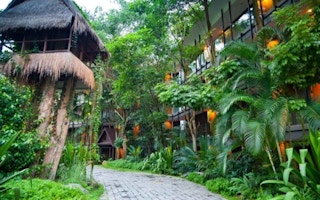When it comes to green buildings in Southeast Asia, new trends are fast emerging. Experts say developers are starting to focus on the well-being of building users and are viewing buildings as an integral part of the environment and community.
With half of the world’s new buildings estimated to be built in Asia over the next decade, the building sector has a potentially big impact on the well-being of a large segment of the Asian population.
Speaking at a sessionon the second day of theInternational Green Building Conference (IGBC) in Singapore, senior lecturer from the Department of Architecture at the National University of Singapore (NUS), Dr Nirmal Kishnani, said that there needs to be a higher level of sustainability when it comes to green buildings.
He urged green builders to raise their sustainability standards and noted the growing awarenessof the need to connect green buildings with the wellness factor among the inhabitants.
He told Eco-Business that rather than talking about a building’s efficiency, the focus should be on its efficacy, which is a more long-term view of resource management.
“What we’re building today is going to last 50 to 100 years; and therefore anything that we lock into a building is not just about what it does at the point of completion, but about what happens in the next 50 to 100 years,” said Dr Kishnani.
He said while it seemed like wishful thinking for now, he hopes there will be a major shift from looking at green buildings largely from a profit-analysis point of view.
“We are going to start looking at the bigger picture and see how things connect across cities and across nature, because…a tropical rainforest is as much a stakeholder in the planet’s outcome as we are. This is my hope,” he added.
Another area of concern highlighted by experts at the session on Thursday was for developers to understand the importance of lighting in green buildings as a tool for enhancing the well-being of workers.
Vice president of Philips Lighting, Menno Kleingeld, noted that while some political awareness and legislation to encourage the phasing out of inefficient lighting in buildings is in place, more can be done, such as addressing the longer working hours that result from the region’s changing office work patterns.
He said buildersmust take a holistic approach and added that only a minority of buildings use lighting controls, such as mechanisms that automatically dim lights when no one is in a room.
Another problem arises from the ubiquitousglass facades found in many new buildings today. Mr Kleingeld said these facades are not ideal for office workers because they cause glare and “thermal discomfort”. This is especially so in a tropical climate there the sun can be harsher and daylight can last longer.
Mr Kleingeld cited studies which showed that innovation in lighting techniques could lead not only to improved workers’ moods and interpersonal relationships, but also to enhanced cognitive performances and problem solving abilities. He said Philips’ research showed that the right kind of artificial lighting can help improve children’s concentration and reading abilities.
A previous study detailed on the company website found that a 5,000 square metre office building using older, inefficient lighting technology could save EUR 300,000 over 15 years if the building used LED lighting technology.
While awareness is growing, challenges remain, said Mr Kleingeld.
“Lighting only becomes important at the end of the process. The choice for a final lighting solution comes completely at the end of the (design) process. So the buying comes at the end; and typically if you overrun your budget, then the budget that gets cut is the lighting budget,” he said.
Eco-Business.com’s coverage of the International Green Building Conference 2011 is brought to you by City Developments Limited (CDL).















